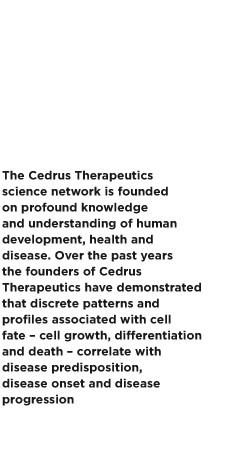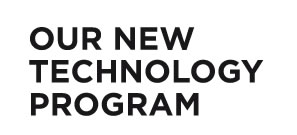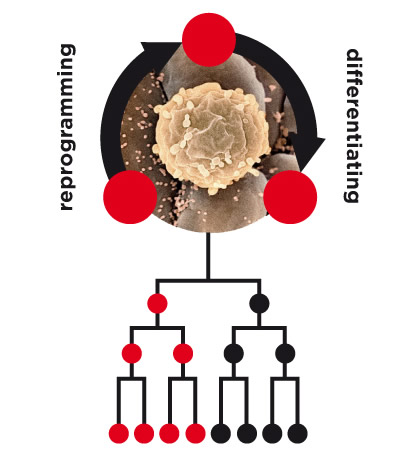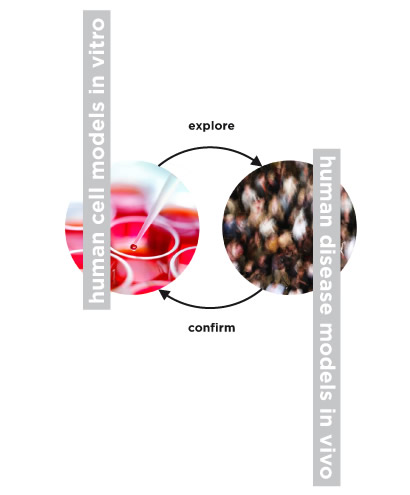


Drugs, and drug combinations and therapeutic sequences can transform disease-associated patterns and profiles to healthy ones. Such drugs direct cell fate, modulate cell growth and differentiation in vivo, and control cell death, thus restoring the balance between regeneration, expansion and decline.
Cells compute the molecular mechanisms of health and disease processes, and represent human disease conditions. Stem cells and their derivatives contain disease-relevant genetic and epigenetic information. Stem cell and cell reprogramming technologies make it possible to functionalize various human genomes and to correlate genotype-phenotype relationships with functional patterns and profiles. Cedrus considers stem cells and reprogrammed cells the basis for determining pattern responses to drug candidates over time and creating and using information patterns about drugs and drug actions for earlier clinical trials. This approach will have significant implications for an alternative and special interpretation of personalized medicine, a differentiated understanding of drugs and drug-based therapies, and eventually for pharmaceutical markets.



Contemporary pharmaceutical research relies on simple mechanistic relationships: cause – effect, input – output. Cedrus Therapeutics considers this research paradigm, “one gene – one disease, one gene – one drug,” too simplistic, too reductionist, out of biological context, and hence prone to fail. Current personalized medicine follows the same understanding and paradigm, and therefore faces technical and economic barriers.
Cedrus Therapeutics has a different approach to drug research, a different understanding of drug-based therapies, and a different and special interpretation of personalized medicine. Cedrus Therapeutics focuses on comprehensive, dynamic patterns of disease and drug actions. Dynamic action patterns reflect disease onset and progression, and open opportunities for disease-modifying therapeutic intervention and cost-effective personalized medicine. Cedrus Therapeutics assays drug-induced transitions of action patterns in bona fide human living systems, i.e. human stem cells and their derivatives.
Our assay systems are non-trivial machines: input, operator, output, with the operator having a life. The input is disease-relevant information, from genetics and epigenetics to specific phenotypes, the clinical course of the disease and the response to therapies. Stem cells and their derivatives are the operators, and reflect human genetics and qualities of life. These “Live Processing Units” (LPUs) comprise cell logics and signaling networks. They integrate signals from both external and internal sources over time. Their output comprises patterns and images which reflect specific, genotype-selective drug responses, phenotypic drug responses, and functional, drug-specific genotype-phenotype relationships.
Cedrus Therapeutics views stem cells as both assay systems for pattern recognition and therapeutic targets for regenerative medicine and oncology. Cedrus Therapeutics pushes regenerative medicine from stem cell transplantation to drug-induced stem cell regeneration in vivo. Cedrus Therapeutics target stem cells within their natural context, to stimulate stem cells in vivo, to direct cell fate, and to modulate cell growth and differentiation in vivo. Our drug candidates act on innate stem cells and their derivatives. We design drugs to regenerate and repair aging, damaged and diseased organs and tissues in vivo. In oncology, our drug candidates selectively target cancer stem cells and individual cancer cells to prevent their expansion and maturation.
Cedrus Therapeutics develops regenerative medicines for neurodegenerative and neuroinflammatory diseases and novel therapeutic strategies in oncology. Cedrus Therapeutics translates chemicals and biologicals into disease-modifying drugs. Our understanding of cellular and molecular disease mechanisms provides the basis for finding novel drugs, our understanding of drug action, pharmacology and current pharmacotherapy the basis for improved drugs. Our translational medicine strategy to develop drugs is defined by two key components of our technology platform: first, the disease- and therapy-relevant assay systems to explore and test our drug candidates; second, the functional stratification of patient populations based on action patterns and various functional biomarkers to confirm clinical responses. Our science and technology platform puts us in the perfect position to find the right drug for the right patient at the right time.
